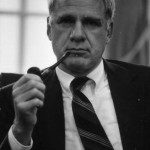Ronald Reagan’s famous “Morning in America” campaign commercial heralded the end of a long dark night in America’s common life. By 1984, we had endured the malaise of the Carter years, the 1979 energy crisis, the Iranian hostage crisis, stagflation, and unemployment that remained in double-digits for ten months. Yet the economy was growing again in leaps and bounds. Unemployment was falling swiftly. After the moral confusion and generational chaos of the 1960s, and the corruption and malaise of the 1970s, America was regaining its sense of self-assurance. The campaign ad celebrated that we could, once more, “look forward with confidence to the future.”
A different kind of morning in America dawned ten years ago on September 12th. A band of hate-filled murderers had boarded four commercial airliners the day before and steered them into the Pentagon, into two skyscrapers teeming with innocent civilians, and would have done the same — but for the actions of a small band of heroes — into the Capitol or the White House. All day long, we had watched in horror and grief, fascination and dread, as our assurance of our own national security and strength was shattered.
It’s good and proper to remember 9/11 on its tenth anniversary. Acts of unthinkable heroism unfolded on that day. But September 12th was no less extraordinary, for that’s when we began to dig our way out. September 11th represents an assault upon our nation, and the mind-bending courage of the first responders who climbed those towers to save the dying and paid the ultimate price. September 12th represents a commitment to soldier on, a commitment not only to respond to the evil zealots who had long since declared war against us, but a commitment, after suffering a devastating blow, to rebuild a safe and flourishing society. On the morning of September 12th, Americans awoke from their rest, remembered what had happened the day before, and then shouldered the burden of grief and carried on.
But the September 12th project is not complete. In many ways, the day that dawned on September 12th has been a gray one. I will always be grateful to President Bush for his leadership in the immediate aftermath of the atrocity. Although I disagreed with the Bush administration’s big-government tendencies, I still believe they took many right steps in response to 9/11. The middle Bush years were in some respects relatively bright: the economy grew, the terrorist network was degraded, and the homeland was kept secure. Yet now those years feel like borrowed time. Corrosive elements that predated the Bush administration were at work beneath the surface, consuming the pillars of our society, economy and government.
In other words, our self-inflicted wounds are far graver than anything al-Qaeda dealt us. The deepest problems we’ve faced over the past decade have had little to do with 9/11. So our response to 9/11 could not fix them. While we were fighting (rightly) against the challenge that 9/11 presented, other challenges went unrecognized and unopposed. In fact, those deeper problems fed upon 9/11 and were exposed by it.
For one thing, the economic expansion of the past two decades floated on the gossamer-thin surface of the dot.com, housing and financial bubbles. The growth of deficit spending that seemed sustainable in the bubble-boom years is now reckless and dangerous. The incestuous relationship between government and public employee unions, and the courting of the aged and the poor with promised entitlements we could not afford to deliver, have led to mountains upon mountains of federal, state and municipal debt. 9/11 did not cause these problems, but it did add military and national security costs on top of our other federal obligations, and the post-9/11 stock market plunge warned of the fragility of our globally integrated financial system.
At the same time, changes in our media and political systems have balkanized the American public into hermetic enclaves of hyper-partisanship. Hyper-partisans can receive their news, commentary and community exclusively from sources that confirm their worst prejudices and suspicions. I know some of my fellow conservatives don’t believe the partisanship we see today is unprecedented, and perhaps unprecedented goes too far. Our system of government depends on creative opposition, checks and balances, and the competition of ideas makes us stronger. Yet there are creative and destructive forms of opposition, opposition that is loyal not only to the country we share but to our fellow Americans with whom we share it.
9/11 did not cause this hyper-partisanship, either, but the hyper-partisanship fed upon it. Remember the “little Eichmanns” in the Twin Towers? “Bushitler” assassination porn? The 9/11 Truthers? The “Texas barbecue” where the case for the Iraq war was “cooked up”? “Torture chambers reopened under new management”? Soldiers killing innocents “in cold blood”? Or the suggestions that Bushitler had Osama bin Laden holed up somewhere and would announce his “capture” right before the 2004 election? And let’s not forget the Far-Lefties who said that “King George” would never give up control of the country. This kind of paranoid hatred was then echoed in the Birther movement — and, although I don’t find it in the Tea Party movement as a whole, one hears its echoes in the claims that Obama is deliberately destroying the economy in order to usher in true socialism. Now again one finds it in the lavish loathing and hatred for Sarah Palin, Michele Bachmann, and the Tea Party. Indeed the hatred of the Tea Party is now so exaggerated and delusional that one finds conversations blaming the Tea Party for lost wages and lost jobs, or saying that hatred of Tea Partiers is just as justified as hatred of Nazis — or accusing the Tea Partiers of wanting to “burn the whole thing to the ground” — or saying they want to lynch black people — or in Vice Presidents calling them “terrorists” and “barbarians” and Congresswomen telling them to “go straight to hell.”
Deception and caricature harm the cause of an educated electorate. The Truther and the Birther, for instance, occupy entirely different worlds, not only with different opinions but with different “facts,” and each sees the other as the enemy. This kind of hatred makes us weaker and less resilient in the face of challenges. It’s hard to rebuild your society when your hands are at each other’s throats.
Yet I would not be so worried about our economic and political problems if I were confident that we had the moral, cultural and spiritual resources to respond to them. On the one hand, we’ve developed a culture that’s thin on the virtues of industry, integrity and self-sufficiency, and thick with passivity, entitlement and resentment. Where those who suffered hardships were once admired when they avoided welfare or received it only briefly, now they’re admired who soak the system for all it’s worth. A free-market economy functions well when it’s undergirded and propelled by the Judeo-Christian work ethic, but we’ve grown fat and complacent, more interested in watching the next Extreme Home Makeover than we are in starting businesses and building companies that provide for our families and employ others. To make matters worse, just when we need strong family units that can better weather the tough times, we have high rates of divorce and delinquent dads, single parents and children with cohabiting couples.
On the other hand, even as our economic and family virtues have waned, so have our patriotic virtues. Passive voices of doom and gloom dominate the headlines. America, they say, is beset with insoluble problems. Our prosperity and our influence are doomed to diminish. Our markets are fixed in inexorable decline. We can neither defeat our enemies in Afghanistan nor match the rise of the Chinese. Our culture has grown insipid and attenuated. Apparently there is nothing for Americans to do but bow their heads and accept their fate.
Since when have Americans been the victims of circumstance?
We’ve lost confidence in ourselves as a nation, partly because we no longer believe in each other. We’re not defeated, but we are defeatist. Instead of fortitude we have fatalism. Perhaps most worrisome, when we are faced with problems we look to the government for solutions. It was not the government that made America great; it was the character and creativity and moral culture of her people.
It’s no secret where this declinism comes from. Many of my former colleagues in academic circles openly yearned for a humbling of the United States. They saw America as a blundering bully on the international blacktop, a kind of callow jock whose brawn far outstripped his brains, and whose actions around the globe were disrupting local cultures, exploiting cheap labor and resources, degrading the environment, and exporting consumerism and cheap culture and rapacious capitalism.
I wonder: America is stumbling now — do they like what they see? With tens of millions unemployed or underemployed or giving up and leaving the work force? With European markets teetering on the edge of disaster, and world markets sure to tank if America enters a depression? Or with the rise of a superpower in China that has no concern for human rights, animal rights or the environment? It’s easy to yearn for the mighty to fall until you see just how much stood upon their shoulders, and just how much will fall with them.
The problems described above are real — but I still believe in this country. I don’t mean that we have a unique covenant with God that will always preserve us. I mean that if we honor the values and principles that God has given us, our society will flourish. Our challenges are great, but so is our heritage. For many decades the United States has been the greatest engine of economic growth in the world. It’s been the greatest champion of democracy and human rights the world has ever seen. It’s largely driven the last century’s astonishing, life-saving advances in science and medicine. And it helped to end the Nazi and Fascist threats in World War 2, helped contain the spread of a political ideology (communism) that takes a catastrophic human toll wherever it is tried, and still casts a security umbrella where nations are safe over vast swaths of the globe.
Can we have another September 12th now, and dig out of the trouble we’re in today? I don’t believe that decline is inevitable. Neither should you believe it. It’s no accident of history that America has succeeded on so extraordinary a scale. Our economic and democratic system have proven remarkably effective. But it is no given, either, that America will succeed again. It will depend, as it always has, first upon the will of God and second upon the character, the courage and the ingenuity of the American people. The question is whether we can reclaim the strengths and the virtues that made the American heritage possible.
The resources within our cultural inheritance are more powerful than the challenges we face. If we can prove that, then we’ll see a Morning in America again.











